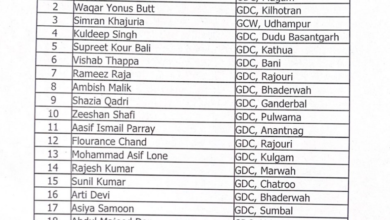J&K: Gram Panchayats Earning Substantially By Raising Green Assets On Vacant State Land
SRINAGAR, Jan 06: The active engagement of Panchayati Raj Institutions (PRIs) in planning and execution of developmental works and efficient delivery of Public Services is essential to achieve the essence of grass root level democracy and decentralized governance
Government of UT of J&K after successfully establishing three tier Panchayati Raj System has taken many decisions to empower PRIs by devolving powers, responsibilities, functions and funds to them. Various essential services having bearing on ‘ease of living’ of common citizens are now being administered through PRIs. Gram Panchayats (GPs) and Urban Local Bodies (ULBs) are getting fully involved and playing meaningful role in collaboration with functionaries of the Government Departments.
One such important mandate which GPs have been carrying forward is raising plantations to establish Green assets by utilizing the vacant Village Common Lands/State lands in their respective Gram Panchayats in collaboration with the Social Forestry Wing under Department of Forests, Environment and Ecology of J&K.
The Village Panchayat Plantation Committees (VPPCs) headed by respective Sarpanchs, identify land, and take up plantations of multipurpose tree species, with technical support of Social Forestry. These plantations are protected and scientifically managed jointly by Social Forestry officials and representatives of VPPCs. The households of Gram Panchayat play active role in protection of plantations and in return they derive benefits by getting free supply of fodder, fuelwood and small timber on equitable basis.
During 2021-22 year, 32112 quintals of Fodder, 16580 quintals of fuelwood was distributed free of cost amongst 20850 rural households of 1646 Gram Panchayats, and thus rendering valuable support to the livestock based rural economy. Jammu and Kashmir Government has enacted the provisions of transferring 75% funds earned from sale of mature plantations to Village Panchayat Funds.
The money deposited in these funds is used by VPPCs for afforestation activities and part of it is also used for taking up other village utility works like village paths and roads, sports facilities, improvement of schools, health facilities, drinking water and other works as per decision of local VPPC.
In last few years, many progressive Gram Panchayats have successfully raised plantations on available vacant lands and established ‘Village Panchayat Funds’ to finance such developmental activities as per needs of their Panchayats.
During, July 2021, Lieutenant Governor, Manoj Sinha while handing over cheques to 41 such Gram Panchayats ranging from Rs. 5 lakhs to Rs. 30 lakhs, expressed his satisfaction on the successful partnership of Department of Social Forestry and Gram Panchayats and emphasised to involve more and more Gram Panchayats in this process.
During 2022, funds worth Rs. 30 lakhs were transferred to five Gram panchayats and in current year the figure may go up to more than two crores benefitting more than 30 GPs as per official statement of the department. This model of collaborative working is an important milestone in the journey of implementation of Panchayati Raj Act towards the empowerment of PRIs and their active role in transforming the developmental landscape of Jammu & Kashmir.
As per Departmental Communique that after such success stories, many other Gram Panchayats have been coming forward and offering parcels of lands to raise plantations and silvi-pasture models.
With the proactive participation of Gram Panchayats, during 2022-23 financial year, plantation of 32 lakh plants in 3500 GPs is being taken up which marks an increase of more than 60% percent over the average achievements prior to 2017-18 and it is expected that achievements would further increase in coming financial year, the official communique adds.
From these Village Woodlots, multiple benefits like fodder, fuelwood, small timber have been accruing free of cost to village households on continual and equitable basis. Harvesting of mature plantations yields raw-material to local wood-based industries, thereby generating new avenues of employment.
Establishment of plantations on lands outside natural forests is contributing to increase the Forest and tree-cover in Jammu and Kashmir to achieve the goal of having 2/3rd of area under Forest and tree cover which is around 50% presently.
The PCCF/Director of Department of Social Forestry, J&K, Roshan Jaggi has expressed optimism and confidence on this evolving working relationship. He disclosed that department in consultation with Gram Panchayats has drawn up plan to establish 4 mega pilots to establish block plantations in the coming plantation season using commercially important clonal varieties.
The pilots are expected to motivate and inspire more and more progressive farmers to take up commercial plantations on their proprietary lands under farm forestry land use.
The promotion of tree-farming outside Natural Forests is a win-win situation as it would reduce dependence on imports and ensure sustained supply of raw-material at cheaper rates to Wood Based industries, increase income of farmers, meet the bonafide needs of local people and will also help meet international obligations on account of Sustainable Development Goals (SDGs) and Climate Change by adding Forest cover and creating Carbon sinks.











